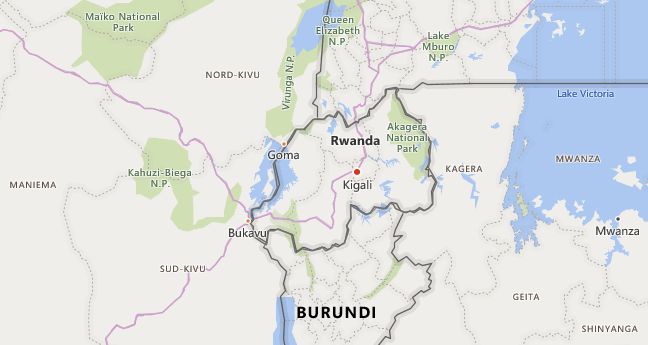There are 8 high school codes in Rwanda today, according to the ACT. The full list is shown below by city, with name of each high school and the city where the school is located (based on the ACT official site). You can search a school code by pressing “Ctrl” + “F” and then type school name or 6-digit school code.
Map of Rwanda
High School Codes by City
- High School Code
- 644002
- High School Code
- 644005
- High School Code
- 644001
- High School Code
- 644000
- High School Code
- 644003
- High School Code
- 644004
- High School Code
- 644006
- High School Code
- 644007
The above lists CEEB codes (College Entrance Examination Board) for all accredited Rwanda high schools. Please be informed that the list of high school codes in Rwanda may change throughout the year. If you can’t find codes for the high schools of your interest, please write to us or come back at a later time. We will update our database soon after a new high school code is added to the country of Rwanda.
Country Abbreviations
Law
The court system includes courts of first instance for minor civil cases and minor criminal offenses, as well as courts of first instance for all major cases. In addition, there are courts of appeal and the Supreme Court in the instance. For the crimes related to the 1994 genocide, the traditional gacaca jurisdiction (»gacaca« = green area, meadow) was activated at community level. The procedures for this were opened between 2005 and 2012. At the international level, the so-called Rwanda Tribunal (International Criminal Court for Rwanda) was set up as a war crimes tribunal based in Arusha (Tanzania) under the responsibility of the UN. It was disbanded at the end of 2015.
Traditional and written law stand side by side, v. a. the civil and commercial law codes adopted from the former Belgian Congo. Many areas of law have been reorganized or modernized after independence in 1962, such as criminal law (1977), family law (1988) and parts of business law (Investment Act 1987, Company Law 1988). The death penalty was abolished in 2007.
Education
There is general compulsory schooling for ages 7 to 15. The school system is divided into a six-year primary and two-tier secondary level (3 years each). The official language of instruction is English (since 2010), and Kinyaruanda is also used. A shortage of funds and a shortage of teachers place narrower limits on school education. Among the public and private higher education institutions are the university (founded in 1963) in Butare and a college of technology and economics (founded in 1998) in Kigali.
Media
Free and independent reporting is often hindered by the state. The state radio »Radio Rwanda« is the most important source of information. There are several newspapers, including the weekly Imvaho Nshya, which is controlled by the state news agency RNA / ARI. The English-language daily newspaper “New Times” is privately owned but close to the government. »Umuseke« is independent. The state “Rwanda Broadcasting Agency” broadcasts radio programs in several languages and a television program (“RTV”). There have been broadcasting stations for digital television since 2014. European international channels are also received, e.g. B. BBC World Service and Deutsche Welle, as well as pay TV from South Africa. The electronic infrastructure is growing rapidly, especially in the capital region.
Tourism
The development of the tourism industry is one of the main goals of the Rwandan government. The national parks (including the stock of mountain gorillas ), but also the country’s cultural and historical heritage, have primarily tourist potential.
Culture
Music, dance, handicrafts, and poetry are early art forms in Rwanda. They were mainly used at ceremonies and celebrations. The inanga, a zither, is one of the traditional musical instruments. The wooden string instrument accompanied the storytellers and reciters of praise poems. Successful new trends in popular music mix classical rhythms with modern elements from the fields of rhythm’n blues, gospel, folk and rap. Its most important representatives include: B. Cecile Kayirebwa ( * 1946 ), Massamba Intore ( * 1969 ) and James Ruhumuriza (* 1990) alias King James.
Alexis Kagame ( * 1912, † 1981 ) is an important name in Rwandan literature. The philosopher, historian, linguist and writer published poems and compiled the orally transmitted history of his country in his works.
Hand-woven baskets and other fine wickerwork are typical examples of the country’s handicrafts.
Today, art and culture, but also sport, are important pillars for the cohesion of the population. Above all, team sports are intended to connect and reconcile the various groups. Soccer is the most popular sport, but handball and volleyball are also popular. The most popular individual sports include marathons, triathlons and cycling. Internationally known is the Tour du Rwanda, an annual cycle race in nine stages that leads through the entire country.

